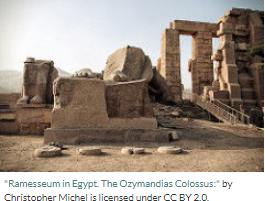Housekeeping: Lots of students have signed up for On-line recovery. I will be checking on your progress. Once you have finished, I will receive notice and will then be able to change the failing marking period grade. MAKE IT HAPPEN!
The poem September Night is due today. Several people have completed everything; they owe no work at all.
If you have completed and submitted both "The Outcasts of Poker Flat" graphic organizer AND essay, you may complete the following poem assignment as a substitute for another missing writing assignment. OR if you owe nothing, and want to simply boost your already excellent grade, please take a look at Ozymandius by Percy Bysshe Shelley at the end of the blog. This well-known poem is one you will hear referenced throughout your life.
This is independent work for class time today and Friday ONLY

11-12R2: I can determine two or more themes or central ideas in a text and analyze their
development, including how they emerge and are shaped and refined by specific
details
11-12R4 I can determine the meaning of words and phrases as they are used in a text,
including figurative and connotative meanings. Analyze the impact of specific word
choices on meaning, tone, and mood.
11-12W2c: I can precise language, content-specific vocabulary and literary techniques to
express the appropriate complexity of a topic.
11-12W2d: I can use appropriate and varied transitions and syntax to make insightful connections
and distinctions, create cohesion, and clarify relationships among complex ideas and concepts
Essential question: How do figurative language devices-imagery, personification and apostrophe- contribute to a poem?
George Marion McClellan (1860-1934) was a minister, teacher, fiction writer, and distinguished African American poet. He is best known for his two poetry collections, Songs of a Southerner and The Path of Dreams. In this poem, the speaker describes a September night in Anguilla, Mississippi
Vocabulary
rankish- growing excessively or out of control
begirt-surrounded by; encompassing*
Anguilla-a town in Mississippi
dapple- marked with rounded spots of color
muscadine-a grapevine species native to the South
katydids-an insect, also called a bush cricket, known for its loud
bayou-(noun) in the souther US a marshy outlet of a lake or river
(see picture above.)
Directions: We will read the poem three times as a class
Note the sound of the words
Note the varied imagery: (seeing (visual)
hearing (auditory)
smelling (olfactory)
tasting (gustatory)
feeling (sensory)
Copy and paste the poem and the questions onto a google doc.
1. Answer the five questions, highlighting the correct response
2. Respond to the use of personification within the poem, listed as number 6)
(personification is defined as a literary device that assigns human qualities and attributes to objects or other non-human things.) Parts 1 and 2 will count as a class participation grade.)
3. (writing grade): follow the prompt (minimum 300 words)
September Night by George Marion McClellan
(1)The full September moon sheds floods of light,
And all the bayou’s face is gemmed with stars,
Save where are dropped fantastic shadows down
From sycamores and moss-hung cypress trees.
(5)With slumberous sound the waters half asleep
Creep on and on their way, ’twixt rankish .reeds,
Through marsh and lowlands stretching to the Gulf.
Begirt with cotton fields, Anguilla sits
Half bird-like, dreaming on her Summer nest.
(10) Amid her spreading figs and roses, still
In bloom with all their Spring and Summer hues,
Pomegranates hang with dapple cheeks full ripe,
And over all the town a dreamy haze
Drops down. The great plantations, stretching far
(15)Away, are plains of cotton, downy white.
O, glorious is this night of joyous sounds;
Too full for sleep. Aromas wild and sweet,
From muscadine, late blooming jessamine,
And roses, all the heavy air suffuse.
(20) Faint bellows from the alligators come
From swamps afar, where sluggish lagoons give
To them a peaceful home. The katydids
Make ceaseless cries. Ten thousand insects’ wings
Stir in the moonlight haze and joyous shouts
(25)Of Negro song and mirth awake hard by
The cabin dance. O, glorious is this night!
The Summer sweetness fills my heart with songs,
I can not sing, with loves I can not speak.
Questions:
1.The setting of this poem is
A. Moonlit river
B. Vibrant rainforest
C. Calm, sleepy bayou
D. Wild Jungle
2. Part A
What does the speaker’s description of the setting reveal about Anguilla?
A. The speaker describes Anguilla as only superficially beautiful, overlooking its history of cotton plantations.
B. The speaker describes Anguilla as infested with various forms of wildlife, suggesting that it is difficult to live there.
C. The speaker describes Anguilla as a drowsy, listless bayou, suggesting it is a dull town.
D. The speaker describes the sounds, sights, and wildlife of Anguilla, showing its abundance of overwhelming beauty.
3 PART B: Which piece of evidence from the poem best supports your response to Part A?
A.“With slumberous sound the waters half asleep / Creep on and on their way, ’twixt rankish reeds, / Through marsh and lowlands stretching to the Gulf.” ( Lines 5-7)
B.“The great plantations, stretching far / Away, are plains of cotton, downy white” ( Lines 14-15)
C.“O, glorious is this night of joyous sounds; / Too full for sleep. Aromas wild and sweet, / From muscadine, late blooming jessamine, / And roses, all the heavy air suffuse.” ( Lines 16-19)
D.“Faint bellows from the alligators come / From swamps afar” ( Lines 20-21)
4.
As used in line 21, what does the word “sluggish” mean?
A. disturbed
B. indifferent
C. drowsy
D. slimy
5.
What do lines 27-28 reveal about the speaker’s point of view?
A.The speaker feels excluded from the natural beauty of the bayou.
B.The speaker is speechless in awe of the bayou.
C.The speaker does not feel worthy of the bayou.
D.The speaker is not allowed to sing or speak about the bayou.
6.
In no fewer than 100 words, explain how the poem uses personification to describe the bayou in Anguilla. What effect does personification have on the meaning of the poem? Cite evidence from the text in your answer.
7. Respond to the following: writing grade.
Within the context of the poem, how do you view and experience nature? Do you have a favorite natural place or favorite way to experience nature, such as hiking? How does your favorite place in nature compare to the description of the poem’s setting? (minimum of 250 words) Make sure to use vivid adjectives to describe this place.
*8. challenge bonus, worth 100 points: An apostrophe is a literary device (different from the grammatical one) that refers to a speech or address to a person who is not present or to a personified object. Identify the apostrophe within September Night.
***********************************
Bonus work. Ozymandius by Percy Bysshe Shelley
Percy Bysshe Shelley, who lived from 1792-1822, was an important poet during a literary and artistic period that’s known as the era of English Romanticism. He is regarded by some as one of the most influential poets in the English language. Ozymandias is one of his best-known works.
.1. Visage (noun) : a person’s face, with reference to their expression
3. Colossal (adjective) : extremely large
Ozymandias by Percy Bysshe
1.I met a traveller from an antique land,
Who said—“Two vast and trunkless legs of stone
Stand in the desert. . . . Near them, on the sand,
Half sunk a shattered visage lies, whose frown,
5. And wrinkled lip, and sneer of cold command,
Tell that its sculptor well those passions read
Which yet survive, stamped on these lifeless things,
The hand that mocked them, and the heart that fed;
And on the pedestal, these words appear:
10. My name is Ozymandias*, King of Kings;
Look on my Works, ye Mighty, and despair!
Nothing beside remains. Round the decay
Of that colossal Wreck, boundless and bare
The lone and level sands stretch far away.”
Part 1:
Highlight the correct response
1.
What
does the traveler describe to the speaker?
A. A tall forest in a
desert
B. A broken statue in
sand
C. Smashed glass in the
sand
D. A desert with
abandoned techniques
2. How does the traveler describe the
expression on the statue?
A.as
compassionate
B. as frightened
C. as thoughtful
D.as arrogant
3. What does the
traveler describe to the speaker?
A.A tall forest standing in a desert
B.A broken statue lying in sand
C. Smashed glass sunken in the sand
D. A desert with abandoned antiques
4. Part A: Which statment best expresses the theme of this poem?
A. Ancient rules are an important part of history
B. People are easily corrupted by pride
C. Be wary of the stories travellers tell
D. Power and greatness will not last forever
5. Part B: Which selection from the text best develops the theme in Part A.
A. I met a traveller from an antique land,
Who said—“Two vast and trunkless legs of stone
Stand in the desert.
B. And wrinkled lip, and sneer of cold command,
Tell that its sculptor well those passions read
Which yet survive, stamped on these lifeless things,
C. And on the pedestal, these words appear:
My name is Ozymandias*, King of Kings;
D. Look on my Works, ye Mighty, and despair!
Nothing beside remains. Round the decay
6. What is the effect of the speaker hearing about this statue from someone else, as oppossed to seeing it with his own eyes?
A. It helps emphasize how the story has been passed on and the reader should doubt the reliabilty of the description
B. It emphasizes how powerful the king was and how much his legend continues to impact culture.
C. It helps emphasize how the story is a tale that is being passed on to the reader, indicating that there is a message to be heeded.
D. It demonstrates the readers susceptability to the influences of others.
7. For what reason did the author include the inscription on the statue:"Look on my works ye Mighty and despair!"
A. It lets the reader know that Ozymandius was a cruel leader.
B. It emphasizes the contrast between the king's arrogance and the ruin his statue has become.
C. It demonstrates the negative attitude the sculptor had about the king.
D. It compares Ozymandius to other famous kings by alluding to the classic Arthurian legend.
8. How does the author use irony to develop the theme of the poem. Cite evidence. Minimum 100 words.
9. In Shelley’s poem Ozymandias’ statue has the inscription, “Look on my works, ye Mighty, and despair!” yet there is nothing but sand and ruins. How much control do we have over how we are remembered in the future? What could Ozymandias have done while he lived that might’ve helped towards the preservation of his statue? Personal response (do not start with I!; minimum 150 words.










Comments
Post a Comment